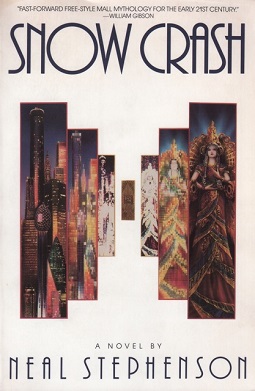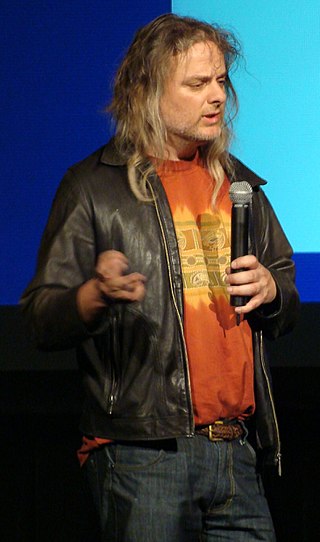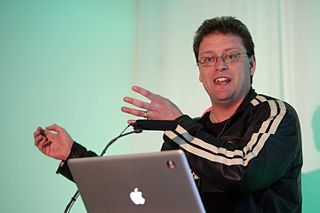Related Research Articles

Virtual reality (VR) is a simulated experience that employs pose tracking and 3D near-eye displays to give the user an immersive feel of a virtual world. Applications of virtual reality include entertainment, education and business. Other distinct types of VR-style technology include augmented reality and mixed reality, sometimes referred to as extended reality or XR, although definitions are currently changing due to the nascence of the industry.

A simulation is the imitation of the operation of a real-world process or system over time. Simulations require the use of models; the model represents the key characteristics or behaviors of the selected system or process, whereas the simulation represents the evolution of the model over time. Often, computers are used to execute the simulation.

Snow Crash is a science fiction novel by the American writer Neal Stephenson, published in 1992. Like many of Stephenson's novels, its themes include history, linguistics, anthropology, archaeology, religion, computer science, politics, cryptography, memetics, and philosophy.

The simulation theory is the hypothesis that reality could be simulated—for example by quantum computer simulation—to a degree indistinguishable from "true" reality. It could contain conscious minds that may or may not know that they live inside a simulation. This is quite different from the current, technologically achievable concept of virtual reality, which is easily distinguished from the experience of actuality. Simulated reality, by contrast, would be hard or impossible to separate from "true" reality. There has been much debate over this topic, ranging from philosophical discourse to practical applications in computing.

David John Chalmers is an Australian philosopher and cognitive scientist specializing in the areas of philosophy of mind and philosophy of language. He is a professor of philosophy and neural science at New York University, as well as co-director of NYU's Center for Mind, Brain and Consciousness. In 2006, he was elected a Fellow of the Australian Academy of the Humanities. In 2013, he was elected a Fellow of the American Academy of Arts & Sciences.

Computer-mediated reality refers to the ability to add to, subtract information from, or otherwise manipulate one's perception of reality through the use of a wearable computer or hand-held device such as a smartphone.

Hermann Maria Hauser, KBE, FRS, FREng, FInstP, CPhys is an Austrian-born entrepreneur, venture capitalist and inventor who is primarily associated with the Cambridge technology community in England.

In computing, an avatar is a graphical representation of a user or the user's character or persona. Avatars can be two-dimensional icons in Internet forums and other online communities, where they are also known as profile pictures, userpics, or formerly picons. Alternatively, an avatar can take the form of a three-dimensional model, as used in online worlds and video games.

In science fiction, the "metaverse" is a hypothetical iteration of the Internet as a single, universal, and immersive virtual world that is facilitated by the use of virtual reality (VR) and augmented reality (AR) headsets. In colloquial usage, a "metaverse" is a network of 3D virtual worlds focused on social and economic connection.
Virtual crime or in-game crime refers to a virtual criminal act that takes place in a massively multiplayer online game, or within the broader metaverse. The huge time and effort invested into such games can lead online "crime" to spill over into real world crime, and even blur the distinctions between the two. Some countries have introduced special police investigation units to cover such "virtual crimes". South Korea is one such country and looked into 22,000 cases in the first six months of 2003.

Demis Hassabis is a British artificial intelligence researcher and entrepreneur. In his early career he was a video game AI programmer and designer, and an expert board games player. He is the chief executive officer and co-founder of DeepMind and Isomorphic Labs, and a UK Government AI Advisor.
Improbable Worlds Limited is a multinational technology company founded in 2012 and headquartered in London, England. It makes metaverse infrastructure and applications, as well as simulation software for video games and corporate use.

Ian Hughes, also known as epredator, is a British metaverse evangelist, technology industry analyst, and television personality. In 2006, he set about leading a group of like-minded individuals and subsequently many thousands of colleagues at IBM into virtual worlds like Second Life, and beyond. This sparked a massive growth in interest from enterprises and press alike. Hughes was a public figure in Web 2.0 and, formerly, a blogger on Eightbar, a site maintained by former and current IBM employees on the fringes of innovation within their labs.
Ashkan Kooshanejad, also known as Ash Koosha, is a British-Iranian technology entrepreneur, multidisciplinary artist, futurist and innovator. He is known to use computer software such as artificial intelligence and virtual reality in his work. He is the CEO and co-founder of Oorbit Inc. and one of the founders of Auxuman Inc. He played the lead role in an Iranian-Cannes jury prize winner docufiction film by director Bahman Ghobadi called No One Knows About Persian Cats, which follows his band's story scouring the Iranian underground music scene trying to find musicians to play in a festival in the UK.

Thomas Webb is a contemporary artist, hacker, video game developer, TEDx speaker and magician. The theme of his work explores how society interacts with technology and the effect of social media and AI on mental health. His artwork is programmed into electronic installations using real-time data sources, AI and computer algorithms.
Kuki is an embodied AI bot designed to befriend humans in the metaverse. Formerly known as Mitsuku, Kuki is a chatbot created from Pandorabots AIML technology by Steve Worswick. It is a five-time winner of a Turing Test competition called the Loebner Prize, for which it holds a world record. Kuki is available to chat via an online portal, and on Facebook Messenger, Twitch group chat, Telegram, Kik Messenger, Discord, and was available on Skype, but was removed by its developer. The AI also has accounts on Instagram, TikTok, YouTube, and Twitter, as well as a game on Roblox.
VPL Research was one of the first companies that developed and sold virtual reality products. It was founded by computer scientist Jaron Lanier in 1984. "VPL" stood for "Virtual Programming Languages". In 1990, VPL Research filed for bankruptcy and in 1999 all of its patents were bought by Sun Microsystems.
Harpinder Singh Narula is a UK-based Indian businessman, the chairman of DS Constructions.

Horizon Worlds is a free virtual reality, online video game with an integrated game creation system developed and published by Meta Platforms. On this multi-player virtual platform, players move and interact with each other in various worlds that host events, games, and social activities. The game works on Oculus Rift S and Meta Quest 2 headsets.
References
- ↑ "Herman NARULA - Personal Appointments (free information from Companies House)". Beta.companieshouse.gov.uk. 11 July 2012. Retrieved 13 May 2017.
- 1 2 3 "Meet Improbable, The Startup Building The World's Most Powerful Simulations". Forbes.com. Retrieved 12 May 2017.
- 1 2 Susannah Butter (30 May 2017). "Meet the man who's about to turn London into a virtual reality playground | London Evening Standard". Standard.co.uk. Retrieved 19 June 2017.
- ↑ "The 'Otherness' Of Living". Verve Magazine. 18 August 2008. Retrieved 18 November 2020.
- 1 2 Amit Roy. "Eye on England: Herman Narula and his Improbable story, Dear Dad, Abir's sequel and Tittle tattle". telegraphindia.com. Archived from the original on 2 August 2017. Retrieved 1 August 2017.
- ↑ Solon, Olivia (29 May 2014). "The Improbable dream to radically transform online gaming | WIRED UK". Wired.co.uk. Retrieved 12 May 2017.
- ↑ "Telegraph Tech Hot 100: The full 2020 list revealed". The Telegraph. 28 October 2020. ISSN 0307-1235 . Retrieved 30 October 2020.
- ↑ ""We must prevent Facebook from running the metaverse": Herman Narula on the fight for a new reality". New Statesman. 15 November 2021. Retrieved 8 March 2022.
- ↑ "Herman Narula on why the metaverse matters". The Economist. ISSN 0013-0613 . Retrieved 8 March 2022.
- ↑ "Welcome to the Metaverse on Apple Podcasts". Apple Podcasts. Retrieved 8 August 2022.
- ↑ Arlidge, John. "My metaverse is better than yours, Mark Zuckerberg". The Times . ISSN 0140-0460 . Retrieved 2 August 2022.
- ↑ "Herman Narula: How Improbable put 4,500 Bored Apes in the same metaverse space". VentureBeat. 3 August 2022. Retrieved 8 August 2022.
- ↑ Poole, Steven (22 September 2022). "From Meatspace to Metaverse: Two Books on Virtual Reality". Wall Street Journal. ISSN 0099-9660 . Retrieved 12 October 2022.
- ↑ Dimoska, Elena (6 February 2023). "Moving into the metaverse | Interview with Herman Narula, Co-Founder and CEO Improbable". EU-Startups. Retrieved 12 February 2023.
- ↑ "Why Improbable's Herman Narula believes virtual society will foster transhumanism". VentureBeat. 3 November 2022. Retrieved 8 November 2022.
- 1 2 3 Duke, Simon. "Herman Narula: Let me take you inside the Matrix". The Times . ISSN 0140-0460 . Retrieved 8 March 2022.